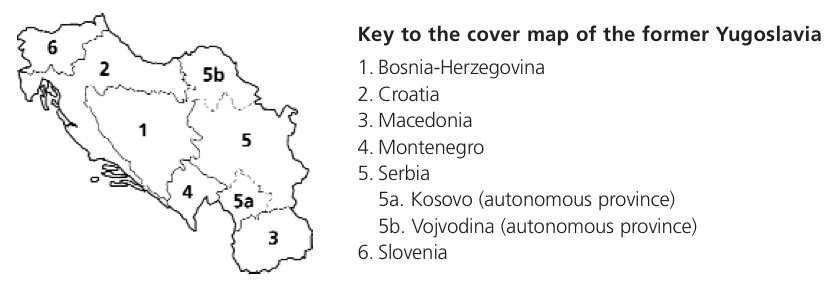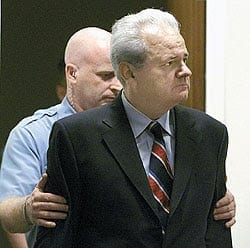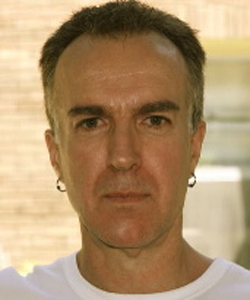From our archives: The Dismantling of Yugoslavia (Part I)
A Study in Inhumanitarian Intervention (and a Western Liberal-Left Intellectual and Moral Collapse)
by Edward S. Herman and David Peterson • First run on Monthly Review on Oct 01, 2007 • (Republished on TGP on Oct 10, 2007)
Jump to Part: II, III, IV | Glossary | Timeline
[dropcap]T[/dropcap]he breakup of Yugoslavia provided the fodder for what may have been the most misrepresented series of major events over the past twenty years. The journalistic and historical narratives that were imposed upon these wars have systematically distorted their nature, and were deeply prejudicial, downplaying the external factors that drove Yugoslavia’s breakup while selectively exaggerating and misrepresenting the internal factors. Perhaps no civil wars—and Yugoslavia suffered multiple civil wars across several theaters, at least two of which remain unresolved—have ever been harvested as cynically by foreign powers to establish legal precedents and new categories of international duties and norms. Nor have any other civil wars been turned into such a proving ground for the related notions of “humanitarian intervention” and the “right [or responsibility] to protect.” Yugoslavia’s conflicts were not so much mediated by foreign powers as they were inflamed and exploited by them to advance policy goals. The result was a tsunami of lies and misrepresentations in whose wake the world is still reeling.

From 1991 on, Yugoslavia and its successor states were exploited for ends as crass and as classically realpolitik as: (1) preserving the NATO military alliance despite the disintegration of the Soviet bloc—NATO’s putative reason for existence; (2) overthrowing the UN Charter’s historic commitments to non-interference and respect for the sovereign equality, territorial integrity, and political independence of all states in favor of the right of those more enlightened to interfere in the affairs of “failing” states, and even to wage wars against “rogue” states; (3) humiliating the European Union (EU) (formerly the European Community [EC]) over its inability to act decisively as a threat-making and militarily punitive force in its own backyard; (4) and of course dismantling the last economic and social holdout on the European continent yet to be integrated into the “Washington consensus.” The pursuit of these goals required that certain agents within Yugoslavia be cast in the role of the victims, and others as villains—the latter not just belligerents engaged in a civil war, but evil and murderous perpetrators of mass crimes which, in turn, would legitimate military intervention. At its extreme, in the work of the International Criminal Tribunal for the Former Yugoslavia (ICTY), Yugoslavia has been cast as one gigantic crime scene, with the wars in their totality to be explained as a “Joint Criminal Enterprise,” the alleged purpose of which was the expulsion of non-Serbs from territories the Serbs wanted all to themselves—an utterly risible caricature, as we show below, but taken seriously in Western commentary, much as Iraq’s “weapons of mass destruction” were to be taken early in the next decade.
While the destruction of Yugoslavia had both internal and external causes, it is easy to overlook the external causes, despite their great importance, because Western political interests and ideology have masked them by focusing entirely on the alleged resurgence of Serb nationalism and drive for a “Greater Serbia” as the root of the collapse. In a widely read book that accompanied their BBC documentary, Laura Silber and Allan Little wrote that “under Milosevic’s stewardship” the Serbs were “the key secessionists,” as Milosevic sought the “creation of a new enlarged Serbian state, encompassing as much territory of Yugoslavia as possible,” his “politics of ethnic intolerance provok[ing] the other nations of Yugoslavia, convincing them that it was impossible to stay in the Yugoslav federation and propelling them down the road to independence.” In another widely read book, Misha Glenny wrote that “without question, it was Milosevic who had willfully allowed the genie [of violent, intolerant nationalism] out of the bottle, knowing that the consequences might be dramatic and even bloody.” Noel Malcolm found that by the late 1980s, “Two processes seemed fused into one: the gathering of power into Milosevic’s hands, and the gathering of the Serbs into a single political unit which could either dominate Yugoslavia or break it apart.” For Roy Gutman, the war in Bosnia-Herzegovina “was the third in a series of wars launched by Serbia….Serbia had harnessed the powerful military machine of the Yugoslav state to achieve the dream of its extreme nationalists: Greater Serbia.” For David Rieff, “even if [Croatia’s President Franjo] Tudjman had been an angel, Slobodan Milosevic would still have launched his war for Greater Serbia.”1
In a commentary in 2000, Tim Judah wrote that Milosevic was responsible for wars in “Slovenia, Croatia, Bosnia, Kosovo: four wars since 1991 and [that] the result of these terrible conflicts, which began with the slogan ‘All Serbs in One State,’ is the cruelest irony.” Sometime journalist, sometime spokesperson for the ICTY at The Hague, Florence Hartmann, wrote that “Long before the war began, Slobodan Milosevic in Serbia and, following his example, Franjo Tudjman in Croatia, had turned their backs on the Yugoslav ideal of an ethnically mixed federal State and set about carving out their own ethnically homogeneous States. With Milosevic’s failure, in 1991, to take control of all of Yugoslavia, the die was cast for war.” After Milosevic’s death in 2006, the New York Times’s Marlise Simons wrote about the “incendiary nationalism” of the man who “rose and then clung to power by resurrecting old nationalist grudges and inciting dreams of a Greater Serbia…the prime engineer of wars that pitted his fellow Serbs against the Slovenes, the Croats, the Bosnians, the Albanians of Kosovo and ultimately the combined forces of the entire NATO alliance.” And at the more frenzied end of the media spectrum, Mark Danner traced the Balkan war dynamic to the Serbs’ “unquenchable blood lust,” while Ed Vulliamy asserted that “Once Milosevic had back-stabbed his way to power and had switched from communism to fascism, he and Mirjana set out to establish their dream of an ethnically pure Greater Serbia cleansed of Croats and ‘mongrel races’ such as Bosnia’s Muslims and Kosovo’s Albanians.”2
This version of history—or ideology under the guise of history—fails at multiple levels. For one, it ignores the economic and financial turbulence within which Yugoslavia’s highly indebted, unevenly developed republics and autonomous regions found themselves in the years following Tito’s death in 1980, the aptly named “great reversal” during which the “standard of living whose previous growth had muted most regional grievances and legitimized Communist rule declined by fully one-quarter.”3 It also ignores the geopolitical context marked by the decline and eventual dissolution of the Soviet bloc, just as it ignores the German, Austrian, Vatican, EU, and eventual U.S. interest in the dismantlement of the socialist as well as federal dimensions of a unitary Yugoslav state, and the actions that brought about that result. Furthermore, it underrates the importance of Albanian (Kosovo), Slovene, Croat, Macedonian, Bosnian Muslim, Montenegrin, and even Hungarian (Vojvodina) nationalisms, and the competing interests of each of these groups as they sought sovereignty within, and later independence from, Yugoslavia. Perhaps most critical of all, it overrates the Serbs’ and Milosevic’s nationalism, gives these an unwarranted causal force, and transforms their expressed interest in preserving the Socialist Federal Republic of Yugoslavia (SFRY) and/or allowing Serbs to remain within a single unified successor state into wars of aggression whose goal was “Greater Serbia.”
The standard narrative also fails egregiously in claiming the Western interventions humanitarian in purpose and result. In that narrative those interventions came late but did their work well. We will show on the contrary that they came early, encouraged divisions and ethnic wars, and in the end had extremely damaging effects on the freedom, independence, and welfare of the inhabitants, although they served well the ends of Croatian, Bosnian Muslim, and Kosovo Albanian nationalists, as well as those of the United States and NATO. Furthermore, NATO’s 1999 bombing war against Yugoslavia, in violation of the UN Charter, built upon precedents set by NATO’s late summer 1995 bombing attacks on the Bosnian Serbs. More important, it provided additional precedents which advanced the same law-of-the-jungle lineage under the cover of “human rights.” It thus served as a precursor and a model for the subsequent U.S. regime’s attacks on Afghanistan and Iraq, and the lies that enabled them.
Another notable feature of the dismantling of Yugoslavia was the very widespread support for the Western interventions expressed by liberals and leftists. These intellectuals and journalists swallowed and helped propagate the standard narrative with remarkable gullibility, and their work made a major contribution to engineering consent to the ethnic cleansing wars, the NATO bombing attacks, the neocolonial occupations of Bosnia and Kosovo, and the wars that followed against Afghanistan and Iraq.
1. Geopolitics and Nationalism
The Yugoslav (or “South Slav”) solution to this region of Southeastern Europe’s “national question” had always been tenuous. “Failure…to maintain the [united, federal] state throughout the…country’s existence [was] an ever present possibility,” Lenard Cohen and Paul Warwick write. Croatia, Bosnia-Herzegovina, and Kosovo—the three most bloodily contested areas in the 1990s—had all been “areas of high ethnic fragmentation” and “persistent hotbeds of political criminality.” Throughout Yugoslavia’s brief history, ethnic unity “was more an artifact of party pronouncements, induced personnel rotation, and institutional reorganization, than an outcome of genuine political incorporation or enhanced cohesion among the different segments of the population”4
This fragile state of affairs had been held together by the rule of Tito, along with Western support for the independent Yugoslavia in an otherwise Soviet-dominated area. Tito’s death in 1980 loosened the authoritarian cement. The collapse of the Soviet bloc a decade later deprived Yugoslavia of Western support for the unified state. As the last U.S. ambassador to Yugoslavia purportedly instructed Belgrade upon his arrival in April 1989: “Yugoslavia no longer enjoyed the geopolitical importance that the United States had given it during the Cold War.”5
Yugoslavia’s economy was deeply troubled by the 1980s. Unemployment was dangerously high and persistent. Regional inequalities remained the rule. On a per-capita basis, Slovenia’s income by the late 1980s was at least twice the average for Yugoslavia as a whole, Croatia’s more than one-fourth greater, and Serbia proper’s roughly equal to the average. But Montenegro’s was only 74 percent of Yugoslavia’s average, Bosnia-Herzegovina’s 68 percent, Macedonia’s 63 percent, and Kosovo’s 27 percent.6 What is more, Yugoslavia borrowed abroad heavily in the 1970s, and it accumulated a large external debt that stood at $19.7 billion in 1989.7 With hyperinflation spiking upward to more than 1,000 percent this same year,8 Yugoslavia was pressured by the IMF to undertake a classic “shock therapy” program that threatened the solidarity of its population.
Economic decline was accompanied by a diminished confidence in the federal system and the rise of republican challenges to it. But as Susan Woodward notes, taking the lead “were not the unemployed but the employed who feared unemployment” and property owners who feared “that they would lose value and status.” It was in the two wealthiest republics of the northwest, Slovenia and Croatia, but Slovenia in particular, that the drive toward autonomy took the most pronounced anti-federal form.9 Although less than 30 percent of Yugoslavia’s population lived in Slovenia and Croatia, they accounted for half of federal tax revenues—before they stopped paying it. They openly resented these obligations. Longing for closer ties with Western Europe, they revolted.10
In what Robert Hayden calls the “new doctrine of republican supremacy,” by midsummer 1989 Slovenia had rejected the federation. Amendments were proposed for Slovenia’s constitution that clashed with its federal counterpart. Among these was a notorious amendment that defined “Slovenia” as the “state of the sovereign Slovenian nation”—a change that the Borba newspaper (Belgrade) editorialized would “divide Yugoslavia.” In February 1990, the Constitutional Court (a federal body) ruled against Slovenia’s assertion that its laws took precedence over federal ones. This included the “question of secession,” which the court ruled “could only be decided jointly with the agreement of all the republics.” The court also ruled “that the Presidency of Yugoslavia would have both the right and the obligation to declare a state of emergency in Slovenia if some general danger threatened the existence or constitutional order of that republic, on the grounds that such a condition would also threaten the whole of the country.” Slovenia “rejected the court’s jurisdiction,” Hayden adds.
In April 1990, both Slovenia and Croatia held the first multiparty elections in Yugoslavia since the late 1930s. A coalition of six parties called DEMOS that campaigned on an independence platform received 55 percent of the Slovene vote. In Croatia, Franjo Tudjman’s blatantly nationalistic and separatist Croatian Democratic Union received 70 percent. News accounts conveyed the resurgence of nationalist politics in Slovenia and Croatia, along with a distinct flavor of ethnic chauvinism pitting these Westernized republics against the other, less advanced counterparts. Hayden notes that on July 2, 1990, the Slovene parliament declared Slovenia’s “complete sovereignty,” and that the “republic’s laws superseded those of the federation.” Then on July 25, Croatia’s parliament did likewise, making Croatia “a politically and economically sovereign state” (Tudjman). Finally in September—still three months before its own republican elections, in which Milosevic’s Socialist Party received 65 percent on a platform of preserving Yugoslavia, in explicit opposition to the separatist parties that had come to power in Slovenia and Croatia, and were to be soundly defeated in Serbia—Serbia adopted a new constitution granting its laws the same supremacy over federal institutions. “If the Slovenes can do it, so can we,” a member of the Serbian Presidency said. With these challenges to federal authority by each of the three most powerful republics, the “collapse of the Yugoslav state was inevitable,” Hayden concludes.11
In contrast to the standard narrative, it is clear that nationalist forces at this time were stronger in Slovenia and Croatia than in Serbia. The decisive, history-making difference, however, was that in Slovenia and Croatia, the nationalist parties that won the April 1990 elections also adopted separatist platforms. Not only did they challenge the federal institutions as a whole, they also sought to sever ties with them—the last real bonds left from the Tito era.
Had Western powers supported the federal state, Yugoslavia might have held together—but they did not. Instead they not only encouraged Slovenia, Croatia, and later Bosnia-Herzegovina to secede, they also insisted that the federal state not use force to prevent it. Diana Johnstone recounts a January 1991 meeting in Belgrade between the U.S. ambassador and Borisav Jovic, a Serb then serving on Yugoslavia’s collective State Presidency. “[T]he United States would not accept any use of force to disarm the paramilitaries,” Jovic was told. “Only ‘peaceful’ means were acceptable to Washington. The Yugoslav army was prohibited by the United States from using force to preserve the Federation, which meant that it could not prevent the Federation from being dismembered by force”12—a remarkable injunction against a sovereign state. Similar warnings were communicated by the EC as well. We might try to imagine what the United States would look like today, were the questions it faced in 1860 about its federal structure and the rights of states handled in as prejudicial a manner by much stronger foreign powers.
At the heart of the multiple civil wars had always been a simple question: In which state do the people of Yugoslavia want to live—the SFRY or a successor state?13 But for a great many Yugoslavs, an answer contrary to their desires and contrary to the Yugoslav constitution was imposed from the outside. One way this was accomplished was by the EC’s September 1991 appointment of an Arbitration Commission—the Badinter Commission—to assess legal aspects of the contests over Yugoslavia. This body’s work provided a “pseudo-legal gloss to the [EC’s] opportunistic consent to the destruction of Yugoslavia demanded by Germany,” Diana Johnstone writes.14 On each of the major issues contested by the Serbian republic, the commission ruled against Serbia. Yugoslavia was “in the process of dissolution,” the commission’s notorious Opinion No. 1 stated when published on December 7, 1991. Similarly, Opinion No. 2 held that “the Serbian population in Croatia and Bosnia-Herzegovina…[does not] have the right to self-determination,” though it “is entitled to all the rights concerned to minorities and ethnic groups under international law….” And Opinion No. 3 declared that “the [former] internal boundaries between Croatia and Serbia and between Bosnia-Herzegovina and Serbia…[have] become frontiers protected by international law.”15 Remarkably, the commission recognized the right of republics to secede from the former Yugoslavia, and thus affixed the right of self-determination to Yugoslavia’s former administrative units; but the commission detached the right of self-determination from Yugoslavia’s peoples, and thus denied comparable rights to the new minorities now stranded within the breakaway republics. The breakaway republics themselves might be blessed with foreign recognition; or, like Serbia and Montenegro for the remainder of the decade, recognition would be withheld, and its peoples rendered effectively stateless.
From the standpoint of conflict resolution, this was a disastrous set of rulings, as the republics had been administrative units within Yugoslavia, and three of them (Croatia, Bosnia-Herzegovina, and Serbia) included large ethnic minorities who strongly opposed the terms of Yugoslavia’s breakup, and who had been able to live with each other in relative peace on condition that their rights were safeguarded by a powerful federal state. Once the guarantees of the federal state were removed, it was inflammatory to deny peoples the right to choose the successor state in which they wanted to live; and the more ethnically mixed a republic or even commune, the more provocative the foreign demand that the old internal republican boundaries were sacrosanct.16 But the Badinter Commission’s rulings made perfect sense from a much different standpoint: That of prescribing an outline for Yugoslavia’s dismantlement that was in accord with the demands of the secessionist forces in Slovenia, Croatia, and Bosnia-Herzegovina and their Western supporters, while ignoring the rights (and wishes) of the constituent “nations” as specified in the Yugoslav constitution, and justifying foreign interference in the civil wars as a defense of the newly independent states.
Germany in particular encouraged Slovenia and Croatia to secede, which they did on June 25, 1991; formal recognition was granted on December 23, one year to the day after 94.5 percent of Slovenes had voted in a referendum in favor of independence. EC recognition followed on January 15, 1992, as did U.S. recognition in early April, when Washington recognized Slovenia, Croatia, and Bosnia-Herzegovina all at once. More provocative yet, whereas the UN admitted all three breakaway republics as member states on May 22, it withheld the admission of a successor state to the dismantled Yugoslavia for another eight-and-a-half years; the Federal Republic of Yugoslavia, composed of Serbia and Montenegro, often denigrated as the “rump” Yugoslavia, was not admitted until November 1, 2000, almost four weeks after Milosevic’s ouster. In other words, the two republics within the SFRY—itself a founding member of the UN—that rejected the dismantling of the federal state had been denied the right to succeed the SFRY as well as membership within the UN for close to a decade. At this highest level of the “international community,” it would be difficult to find a more extreme case of realpolitik at work, but it was a realpolitik that assured a violent outcome—and to the victor, the spoils.
A far more aggressive U.S. policy toward Yugoslavia began in 1993, with Washington anxious to redefine NATO’s mission and to expand NATO eastward; and searching for a client among the contestants, Washington settled on the Bosnian Muslims and Alija Izetbegovic. To serve these ends the Clinton administration sabotaged a series of peace efforts between 1993 and the Dayton accords of 1995;17 encouraged the Bosnian Muslims to reject any settlement until their military position had improved; helped arm and train the Muslims and Croats to shift the balance of forces on the ground;18 and finally settled at Dayton with an agreement that imposed upon the warring factions terms that could have been had as early as 1992, but for one missing link: In 1992, a Western-managed neocolonial regime, complete with NATO serving as its military enforcer, still was not achievable.19 Now into the twelfth year after Dayton, Bosnia remains a foreign occupied, severely divided, undemocratic, and in every sense of the term—failed state.20
A similar process took place in Kosovo, where an indigenous, ethnic Albanian independence movement was captured by an ultra-nationalist faction, the Kosovo Liberation Army (KLA), whose leaders soon recognized that, like the Bosnian Muslims, they could enlist U.S. and NATO sponsorship and military intervention by provoking Yugoslav authorities to violence and getting the incidents reported the right way. Thus in the year before NATO’s seventy-eight-day bombing war in the spring of 1999, the “KLA were responsible for more deaths in Kosovo than the Yugoslav authorities had been,” British Defense Secretary George Robertson told his Parliament.21 As was true of the Bosnian Muslim and Croat forces before their major spring and summer offensives in 1995, the KLA received covert training and supplies from the Clinton administration,22 a well-guarded secret to the Western publics then being fed lines about “Milosevic’s willing executioners” marching off to perpetrate genocide in Kosovo.
On matters of principle, neither the EU nor the United States have been consistent on secession rights. In 1991–92, they encouraged the republics of Slovenia, Croatia, and Bosnia-Herzegovina to break away from Yugoslavia; the federal state was denied any right to use force to prevent them from doing so; and no one living within these republics was permitted to break away from them. And yet as recently as June 2006, the EU, United States, and UN accepted Montenegro’s right to break away from its Serbian partner; and more recently, the UN’s special envoy for Kosovo Martti Ahtisaari has supported the right of the Serbian province of Kosovo to break away from Serbia once and for all—“to be supervised for an initial period by the international community.” Calling NATO-occupied Kosovo “a unique case that demands a unique solution,” Ahtisaari reassured that Kosovo would not “create a precedent for other unresolved conflicts.” With resolution 1244, Ahtisaari reports, the “Security Council responded to Milosevic’s actions in Kosovo by denying Serbia a role in its governance, placing Kosovo under temporary UN administration and envisaging a political process designed to determine Kosovo’s future. The combination of these factors makes Kosovo’s circumstances extraordinary.”23
The UN special envoy is badly deluded. Kosovo is a NATO-occupied province in southern Serbia, following NATO’s illegal war in the spring of 1999. Kosovo’s status ought to be no different than was Kuwait’s on August 3, 1990: It is a territory taken by military force in contravention of the UN Charter, and its independence should mean above all the restoration of its sovereignty to Serbia. But as with the subsequent U.S. wars and occupations of Afghanistan and Iraq, the Security Council neither condemned NATO’s 1999 aggression nor demanded that measures be taken to remedy it, for the simple reason that three of the Council’s Permanent Five members had launched it. And in 2007, the UN’s special envoy shows not the slightest interest that Serbia entered into its war-ending treaties under the duress of a conquered state. Instead of demanding that NATO return the province to the country from which it was seized, the UN not only accepts the aggression as a fait accompli, but also affirms its legitimacy on “humanitarian” grounds. The Ahtisaari solution is a case of “commissioned power politics.”24 The only “extraordinary” circumstance is to be found in which group of states launched the war. (On the fraudulence of the “humanitarian” rationale for NATO’s war, and the inhumanitarian effects of both the war and occupation, see sections 9 and 10.)
In sum, the United States and NATO entered the Yugoslav struggles quite early and were key external factors in the initiation of ethnic cleansing, in keeping it going, and in working toward a violent resolution of the conflicts that would keep the United States and NATO relevant in Europe, and secure NATO’s dominant position in the Balkans.
2. The Role of the Serbs, Milosevic, and ‘Greater Serbia’
A key element in the myth structure holds that Milosevic incited the Serbs to violence, setting loose the genie of Serb nationalism from the bottle that had contained it under Tito. During the prosecution’s opening statement at his trial, a videotape was played of Milosevic uttering the words “No one should dare beat you” at the Hall of Culture in Pristina in April 1987. “It was that phrase…and the response of others to it that gave this accused the taste or a better taste of power, maybe the first realisation of a dream,” prosecutor Geoffrey Nice told the court. With these words Milosevic “had broken the taboo of [Tito] against invoking nationalism,” Dusko Doder and Louise Branson write, “a taboo credited with submerging ethnic hatreds and holding Yugoslavia together for more than forty years….The initial impact was catastrophic: rabid ethnic nationalism swept all regions of Yugoslavia like a disease.”25
But neither these remarks by Milosevic nor his June 28, 1989, speech on the six-hundreth anniversary of the Battle of Kosovo had anything like the characteristics imputed to them. Instead Milosevic used both speeches to appeal to multi-ethnic tolerance, accompanied by a warning against the threat posed to Yugoslavia by nationalism—“hanging like a sword over their heads all the time” (1989).26
In his 1987 speech—the words “no one should dare beat you” having been uttered in response to the news that the police had roughed up some local Serbs—Milosevic said “we do not want to divide people into Serbs and Albanians, but we must draw the line that divides the honest and progressive who are struggling for brotherhood and unity and national equality from the counterrevolution and nationalists on the other side.” Similarly in his 1989 speech, he said that “Yugoslavia is a multinational community and it can survive only under the conditions of full equality for all nations that live in it,” and nothing in either of these speeches conflicted with this sentiment—nor can quotes like these be found in the speeches and writings of Tudjman or Izetbegovic. But the standard narrative steers clear of Milosevic’s actual words, understandably, as the misrepresentation that surrounds the simple phrase “no one should dare beat you” is deeply ingrained, and repeated by the ICTY’s prosecutor, Silber and Little, Glenny, Malcolm, Judah, Doder and Branson, and a cast of thousands; also by The Guardian and the New York Times, to name but two, all of whom allude to these speeches in the inciting-Serb-nationalism mode, but almost surely never bothered to read and report their actual content.
The massive trial of Milosevic, with 295 prosecution witnesses and 49,191 pages of courtroom transcripts, failed to produce a single credible piece of evidence that Milosevic had spoken disparagingly of non-Serb “nations” or ordered any killings that might fall under the category of war crimes. But the so-called Brioni Transcript of talks that Croatian President Franjo Tudjman held with his military and political leadership on July 31, 1995, reveal Tudjman instructing his generals to “inflict such a blow on the Serbs that they should virtually disappear.”27 What followed within days was Operation Storm, a massive, well-planned military blow that made the Krajina Serbs literally disappear. Imagine the windfall that a statement such as Tudjman’s would have provided Carla Del Ponte, Geoffrey Nice, Marlise Simons, and Ed Vulliamy, had it been Milosevic who uttered a statement directly linking him to criminal activity of this magnitude. But by the summer of 1995 Tudjman was a U.S. ally, and Operation Storm was approved and aided by the United States and some of its corporate mercenaries.28
Similarly, in Alija Izetbegovic’s Islamic Declaration, first circulated in 1970 but republished in 1990 for his presidential campaign, his major theme is what he called the “incompatibility of Islam with non-Islamic systems.” “There is neither peace nor coexistence between the ‘Islamic religion’ and non-Islamic social and political institutions,” Izetbegovic argued. “Having the right to govern its own world, Islam clearly excludes the right and possibility of putting a foreign ideology into practice on its territory. There is thus no principle of secular government and the State must express and support the moral principles of religion.”29 Again, nothing ever uttered by Milosevic matches this for a program of ethno-religious intolerance. But as it was the prescription of a man who became a key U.S. client, Izetbegovic’s beliefs were ignored by the same journalists and historians for whom “no one should dare beat you” was alleged to herald the breakup of an entire country. Instead, David Rieff adopted the Bosnian Muslims as his “just cause” because, in his account, theirs was “a society committed to multiculturalism…and tolerance, and of an understanding of national identity as deriving from shared citizenship rather than ethnic identity”—and this witness-bearer claims to be referring to the “values” and “ideals” that Izetbegovic’s Bosnia would uphold!30
In the series of ICTY indictments of Milosevic et al., the charge that he was striving to produce a “Greater Serbia” ranks high among the causes of the wars. This is also the standard formula that entered into the intellectual and media narrative of cause, as expressed by Judah’s statement “that it all began with the slogan ‘All Serbs in One State’” and in an obituary in the Washington Post in March 2006, where we read again that Milosevic’s “pledge to unify all Serbs in one state turned into an ironic promise.” And in a comprehensive offering of cliché lies, we find Mark Danner in the New York Review of Books stating: “As had the Yugoslav wars, the Dayton peace sprang from the forehead of Slobodan Milosevic, the architect of Greater Serbia, the man who had built his power base by inciting and exploiting Serb nationalism.”31

Milosevic humiliated. Held like a common criminal. This is what should happen to Western leaders, the real senior mass murderers.
One serious problem with the prosecution’s theory and the premise of the establishment narrative—that Yugoslavia’s wars were the result of the “incendiary nationalism” (Marlise Simons), “blood lust” (Mark Danner), and ruthless contempt for the “mongrel races” (Ed Vulliamy) by the Serbs and Milosevic—is that Serbia proper, the alleged heartland of this “joint criminal enterprise,” was itself subject to no “ethnic cleansing” whatsoever throughout the wars, but witnessed a net inflow of refugees from other former republics. (For data on refugee flows in the former Yugoslavia, see section 9.) This dramatic fact was brought out by Milosevic in his trial, during his examination of defense witness Mihailo Markovic, a noted professor of philosophy and one of the founders of Praxis. Acknowledging the “paradox in view of all these charges” concerning “Greater Serbia” and “ethnic cleansing,” Markovic said that “Serbia still has today the same national structure that it had in the 1970s,” and that although “Serbs were expulsed from practically all the other republics, Serbia did not change.” “Why would Serbs be expelling Croatians from Croatia if they’re not expelling them from Serbia?” Markovic asked the court. “Why would Serbs be expelling Albanians from Kosovo if they’re not expelling them from Belgrade and other parts of Serbia?” Shortly thereafter, Milosevic directed much the same question back toward Markovic:
Milosevic: [I]f you have in mind that the greatest part of that Greater Serbia would be precisely the Republic of Serbia, which did not see any expulsions at all throughout the crisis, do you find it logical that Serbia should initiate expulsions from territories outside of Serbia?
Markovic: Well, I already told you it seems illogical to me.32
Obviously, these are important questions, whose answers cast doubts on a fundamental tenet of the standard narrative. If the Belgrade Serbs, as the alleged originators of the “joint criminal enterprise” to create a “Greater Serbia,” did not implement their conspiracy where they held unquestioned power, inside Serbia proper, then what is the likelihood that the prosecution’s theory for the wars has any merit? Lead prosecutor Geoffrey Nice had no solution for this “paradox.” And Marlise Simons, Mark Danner, Ed Vulliamy, David Rieff, and others have not dealt with it by any method other than yet more misleading rhetoric and strategic silence. This exchange was unreported in any Western media institution.
But in an even more devastating development in the Milosevic trial, which occurred during its defense phase, prosecutor Geoffrey Nice admitted that Milosevic’s objective of allowing Serbs to live in one state “was different from the concept of the Greater Serbia….”33 Nice was responding to questions that had been raised by amicus curiae attorney David Kay and presiding judge Patrick Robinson about the prosecution’s claim that Milosevic et al. had a plan to create a “Greater Serbia,” and what such a plan really meant—a charge that exists in each of the three indictments for Croatia, in both indictments for Bosnia-Herzegovina, and that is either asserted or implied by countless news and historical treatments of the wars. “I had the clear impression that this was an essential foundation of the Prosecution’s case,” Judge Robinson noted.34 A short while later, Judge O-Gon Kwon asked Nice to explain to the court the “difference of the Greater Serbia idea and the idea of one—all Serbs living in one state.” Nice replied:
[I]t may be that the accused’s aim was for that which could qualify as a de facto Greater Serbia….Did he find the source of his position at least overtly in [the] historical concept of Greater Serbia; no, he didn’t. His was…the pragmatic one of ensuring that all the Serbs who had lived in the former Yugoslavia should be allowed for either constitutional or other reasons to live in the same unit. That meant as we know historically from his perspective first of all that the former Yugoslavia shouldn’t be broken up….35
In this passage, Nice betrays the fact that the prosecution itself doesn’t believe its most notorious accusation against Milosevic et al., as to why Yugoslavia broke apart: That leading Serbs in Belgrade and elsewhere conspired to create a living space exclusively for Serbs, cleansed of the other ethnic groups (“Greater Serbia”); that they entered into this conspiracy by no later than August 1, 1991; and that they were willing to perpetrate any atrocity, genocide included, to execute their conspiracy. Instead, what the prosecution really believes is that the breakup of Yugoslavia was accompanied by civil wars, plain and simple; that the principal crime for which Milosevic et al. have always been held responsible among the Western powers was the crime of trying to hold Yugoslavia together, against the West’s efforts to dismantle it; and that once events beyond their control closed-off this option, they attempted to hang onto a smaller successor state established on the same principles as the larger one they had lost. That they were not striving for an “ethnically pure” Serb state was made clear by the absence of any ethnic cleansing in Serbia proper.
Of course, the prosecution would reply that once Yugoslavia had undergone the process of dismantlement—and on July 4, 1992, Opinion No. 8 of the Badinter Commission declared that as a “matter of fact,” the “process of dissolution of the SFRY referred to in Opinion No. 1…is now complete and that the SFRY no longer exists”36—any attempt by the minority Serb populations of Croatia or Bosnia to secede from the new, internationally recognized states and to join the “rump” Yugoslavia was an act of rebellion, and any aid provided by Milosevic to these rebels was interference in the internal affairs of sovereign states, aggressive, and criminal. But Badinter ran roughshod over both Yugoslavia’s constitution and fundamental principles of self-determination: The former reserved the right of secession to Yugoslavia’s constituent nations, not to its administrative units;37 and Badinter’s endorsement of the independence claims of Yugoslavia’s Slovenes, Croats, Muslims, and Macedonians, while rejecting the claims of its Serbs, ranks among the greatest and most costly exercises of the double-standard in modern times.38
Despite the allegations to the contrary, it remained the prosecution’s belief throughout the trial that the Milosevic regime’s political objective at the time of the secessions of Slovenia, Croatia, and later Bosnia-Herzegovina was to preserve the SFRY; and that if this could not be done, then as much of the old SFRY as possible should be kept within a single, unitary successor state. Indeed, this was the reason for which Milosevic’s Socialist Party had received 65 percent of the Serbian vote in December 1990, in the republic’s first multiparty elections: Not to create a “Greater Serbia,” but to preserve Yugoslavia. Until historians recognize that the ultimate crime for which the serial indictments have been brought against Milosevic et al. was the crime of trying to hold the SFRY together or a successor state on a similarly unified, federal model, they will never understand the enormity of what Nice conceded in court on August 25, 2005. As best we can tell, this startling concession to the Milosevic defense and the historical record, which amounted to the prosecution’s de facto abandonment of the main component of the ICTY’s case, has never been reported in the major English-language print media.
Furthermore, it is not even true that Milosevic fought to keep all Serbs in one state. He either supported or agreed to a series of settlements, like Brioni (July 1991), Lisbon (February 1992), Vance-Owen (January 1993), Owen-Stoltenberg (August 1993), the European Action Plan (January 1994), the Contact Group Plan (July 1994), and ultimately the Dayton Accords (November 1995)—none of which would have kept all Serbs in one state.39 He declined to defend the Croatian Serbs when they were ethnically cleansed in two related operations in May and August 1995. He agreed to an official contraction in the earlier SFRY to the Federal Republic of Yugoslavia (i.e., to Serbia and Montenegro—itself further shrunk with the exit of Montenegro), which in effect abandoned the Serbs in Croatia and Bosnia to their fate outside any “Greater Serbia.” His aid to Serbs in both Croatia and Bosnia was sporadic, and their leaders felt him to have been an opportunistic and unreliable ally, more concerned with getting the UN sanctions against Yugoslavia removed than making serious sacrifices for the stranded Serbs elsewhere.
In short, Milosevic struggled fitfully to defend Serbs who felt abandoned and threatened in the hostile, secessionist states of a progressively dismantled Yugoslavia; and he wanted, but did not fight very hard, to preserve a shrinking Yugoslav Federation that would have kept all the Serbs in a successor common state. For historians, journalists, and the ICTY to call this a drive for a “Greater Serbia” is Orwellian political rhetoric that transforms a weak and unsuccessful defense of a shrinking Yugoslavia into a bold and aggressive offensive to seize other peoples’ territory. It is also of interest that the clear drives of Croatian and Kosovo Albanian nationalists toward a “Greater Croatia” and “Greater Albania,” and Bosnian Muslim leader Izetbegovic’s refusal to agree to a settlement (with U.S. encouragement) in hopes that with NATO aid he could rule over all three “nations” in Bosnia, have been ignored in the standard narrative as serious causal factors in the ethnic wars of the 1990s.
It should also be clear that the assured claims of Silber and Little, Glenny, Malcolm, Judah, and Simons (and they are only a small sample from a vast universe) about who was responsible for the breakup of Yugoslavia is ideology and myth parading under the guise of history—easily confuted, but part of the standard narrative that is unchallengeable in a closed system.
Notes
- ↩ Warren Zimmermann, “The Last Ambassador,” Foreign Affairs, March/April, 1995.
- ↩ Dijana Plestina, Regional Development in Communist Yugoslavia (Boulder: Westview Press, 1992), table 6.1, 180. For what these numbers represent, see n. 9, xxvii.
- ↩ World Development Report 1991 (New York: Oxford University Press, 1991), table 21, “Total external debt,” 245.
- ↩ Susan L. Woodward, Balkan Tragedy (Washington, D.C.: Brookings Institution, 1995), esp. figure 3.3, 54.
- ↩ Susan L. Woodward, Socialist Unemployment (Princeton: Princeton University Press, 1995), esp. 345–70, here 361. Also see “Unemployment Rate by Republic or Province,” 384.
- ↩ As Dijana Plestina sums up her study: “[E]conomic regionalism, that is, the pursuit of one’s own region’s economic interests, explains better than any other factor the Yugoslav socialist regime’s overall failure in narrowing regional economic inequalities.” Regional Development in Communist Yugoslavia, 173. She adds that by 1990, the disparity in per capita income between Slovenia and Kosovo had reached as high as 8:1.
- ↩ Robert M. Hayden, Blueprints for a House Divided (Ann Arbor: University of Michigan Press, 1999), 27–52.
- ↩ Diana Johnstone, Fools’ Crusade (New York: Monthly Review Press, 2002), 24.
- ↩ The logic of the constitutional crisis that led to Yugoslavia’s violent breakup is best exemplified by the oft-quoted, oft-misrepresented, and perhaps apocryphal quip attributed to a Macedonian political figure: “Why should I be a minority in your State, when you can be a minority in mine?”
- ↩ Johnstone, Fools’ Crusade, 36–40.
- ↩ Perhaps the most accessible copy of the Arbitration (or Badinter) Commission’s Opinions is to be found within the electronic archives of the European Journal of International Law 3, no. 1 (1992), and 4, no. 1 (1993), http:// www.ejil.org.
- ↩ See the invaluable memoir of David Owen, Balkan Odyssey (New York: Harcourt Brace and Company, 1995).
- ↩ NATO remained the sole military enforcer of Dayton from January 1996 through December 2005, when it was joined by a European Union force (EUFOR).
- ↩ George Robertson, Testimony before the Select Committee on Defense, U.K. House of Commons, March 24, 1999, par. 391.
- ↩ See Johan Galtung et al., “Ahtisaari’s Kosovo proposal,” Transnational Foundation for Peace and Future Research, May 11, 2007.
- ↩ For our reference to the Brioni Transcripts of July 31, 1995, see Milosevic Trial Transcript, June 26, 2003, 23200 (lines 1–10).
- ↩ Ken Silverstein quotes a writer for Soldier of Fortune magazine, who noted that as of early 1995, the Croatian military “consisted of criminal rabble, a bunch of fucking losers. MPRI [i.e., the Virginiabased Military Professional Resources Incorporated] turned them into something resembling an army.” Private Warriors (New York: Verso, 2000), 173.
- ↩ Alija Izetbegovic, Islamic De-claration, 1970, 1990, 30, as posted to the Web site of the Balkan Repository Project, http://www .balkanarchive.org.yu.
- ↩ Milosevic Trial Transcript, November 16, 2004, 33460–63.
- ↩ Milosevic Trial Transcript, August 25, 2005, 43224, lines 11–12.
- ↩ Milosevic Trial Transcript, August 25, 2005, 43227, line 6 through 43228, line 3, emphases added.
- ↩ For the Badinter sources, see note 15, above.
- ↩ According to the opening words of the Preamble to the 1974 Constitution of the SFRY, “The nations of Yugoslavia, preceding from the right of every nation to self-determination, including the right to secession, on the basis of their will freely expressed in the common struggle of all nations and nationalities in the National Liberation War and Socialist Revolution…” (emphases added). See Snezana Trifunovska, ed., Yugoslavia Through Documents (Boston: Martinus Nijhoff Publishers, 1994), 224–33, here 224. No fragment among this Constitution’s 10 principles or 406 articles contradicted what its preamble unambiguously proclaimed, and earlier constitutions (e.g., 1963 and 1971) had as well: That the “subjects” to whom the rights of self-determination and secession belonged were explicitly defined as nations—real flesh and bone people, not republican units in the federation—of which Yugoslavia recognized six equally: Croats, Macedonians, Montenegrins, Bosnian Muslims, Serbs, and Slovenes.
The best way to get around the internet censors and make sure you see the stuff we publish is to subscribe to the mailing list for our website, which will get you an email notification for everything we publish.

THIS WORK IS LICENSED UNDER A Creative Commons Attribution-NonCommercial 4.0 International License







 [dropcap]B[/dropcap]y way of a fitting entrée into the main course of our narrative, the following anecdotes should serve us well. In his myth-shattering 2006 tome
[dropcap]B[/dropcap]y way of a fitting entrée into the main course of our narrative, the following anecdotes should serve us well. In his myth-shattering 2006 tome 























